
(HBO) – The People’s Committee of Cao Phong district on July 5 held a ceremony to recognise Dong Phong commune as a new-style area. Representatives of several provincial departments and agencies, and local people attended the event.

A representative of the provincial Department
of Home Affairs presents the new-style rural area certificate to Dong Phong
commune.
Dong Phong had registered to complete the
target of becoming a new-style rural area in 2017. In 2011, the locality
fulfilled five criteria of a new-style rural area. At the end of 2017, the
commune completed 19 criteria. People’s living standards have been improved
significantly, and local political security and social order and safety
ensured.
Local farmers have shifted from rice
cultivation to sugarcane planting, and developed citrus orchards on hills.
Thanks to such efforts, the commune’s average yearly per capita income hit 15.9
million VND in 2011, and this was brought to 26 million VND last year. The rate
of poor households was reduced to 10.7 percent and that of near-poor
households, 14.2 percent. Up to 86.5 percent of local households were
recognised as cultural families and all the six hamlets in the commune
certified as cultural villages. All schools in the commune have met national
standards. Health insurance coverage in the locality was 95.3 percent, and
92.9% of the total households had access to clean water.
Dong Phong aims to maintain and improve the
quality of the 19 criteria during the 2018-2020 period. The locality will
invest more in rural socio-economic infrastructure, promote production, improve
material and spiritual life of local people and ensure sustainable development.
The Chairman of the provincial People’s
Committee presented a welfare facility valued at 450 million VND to Dong Phong
commune.
At the ceremony, the Cao Phong district
People’s Committee also presented certificates of merit to two collectives and
six individuals in recognition of their outstanding achievements in building
the new-style rural area. /.
According to data from the Hoa Binh Provincial Party Committee, the industrial production index for the first six months of 2025 is estimated to have increased by 20% compared to the same period last year. This marks the highest year-on-year growth rate for this period since 2020.
In the first six months of 2025, Hoa Binh province’s export turnover was estimated at 1.145 billion USD, marking an 18.11% increase compared to the same period in 2024. Import turnover was estimated at $ 804 million, a 17.15% increase, which helped the province maintain a positive trade balance.
The lives of the ethnic minority farmers in Tan Lac district have gradually improved thanks to the new directions in agricultural production. This is a testament to the collective strength fostered through the professional associations and groups implemented by various levels of the district’s Farmers’ Union.
With the motto the "product quality comes first,” after nearly one year of establishment and operation, Muong village’s Clean Food Agricultural and Commercial Cooperative, located in Cau Hamlet, Hung Son Commune (Kim Boi district), has launched reputable, high-quality agricultural products to the market that are well-received by consumers. The products such as Muong village’s pork sausage, salt-cured chicken, and salt-cured pork hocks have gradually carved out a place in the market and they are on the path to obtaining the OCOP certification.
In the past, the phrase "bumper harvest, rock-bottom prices" was a familiar refrain for Vietnamese farmers engaged in fragmented, small-scale agriculture. But today, a new spirit is emerging across rural areas of Hoa Binh province - one of collaboration, organisation, and collective economic models that provide a stable foundation for production.
Maintaining growing area codes and packing facility codes in accordance with regulations is a mandatory requirement for agricultural products to be eligible for export. Recently, the Department of Agriculture and Environment of Hoa Binh province has intensified technical supervision of designated farming areas and packing facilities to safeguard the "green passport" that enables its products to access international markets.



